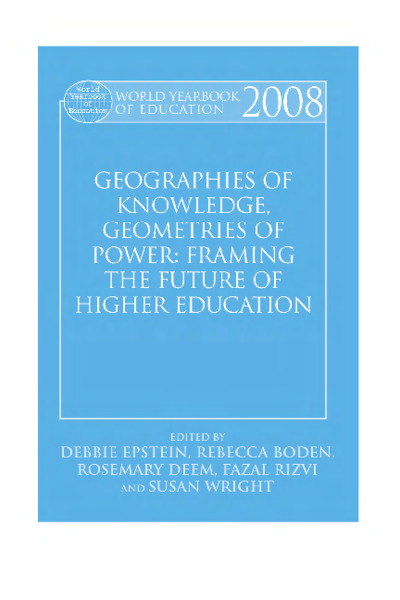World Yearbook of Education 2008Geographies of Knowledge, Geometries of Power: Higher Education in the 21st Century
|

|
 Diese Seite wurde seit 1 Jahr inhaltlich nicht mehr aktualisiert.
Unter Umständen ist sie nicht mehr aktuell.
Diese Seite wurde seit 1 Jahr inhaltlich nicht mehr aktualisiert.
Unter Umständen ist sie nicht mehr aktuell.
 Zusammenfassungen
Zusammenfassungen
 This volume examines higher education in globalized conditions through a focus on the spatial, historic and economic relations of power in which it is embedded. Distinct geometries of power are emerging as the knowledge production capability of universities is increasingly globalized. Changes in the organization and practices of higher education tend to travel from the ‘West to the rest’. Thus, distinctive geographies of knowledge are being produced, intersected by geometries of power and raising questions about the recognition, production, control and usage of university-produced knowledge in different regions of the world. What flows of power and influence can be traced in the shifting geographies of higher education? How do national systems locate themselves in global arenas, and what consequences does such positioning have for local practices and relations of higher education? How do universities and university workers respond to the increasing commodification of knowledge? How do consumers of knowledge assess the quality of the ‘goods’ on offer in a global marketplace? The 2008 volume of the World yearbook addresses these questions, highlighting four key areas: Producing and Reproducing the University— How is the university adapting to the pressures of globalization? Supplying Knowledge—What structural and cultural changes are demanded from the university in its new role as a free market supplier of knowledge? Demanding Knowledge—Marketing and Consumption—How can consumers best assess the quality of education on a global scale? Transnational Academic Flows—What trends are evident in the flow of students, knowledge and capital, with what consequences? The 2008 volume is interdisciplinary in its approach, drawing on scholarship from accounting, finance and human geography as well as from the field of education. Transnational influences examined include UNESCO and OECD, GATS and the effects of digital technologies. Contrasting contexts include Central and Eastern Europe, Finland, China and India and England. With its emphasis on the interrelationship of knowledge and power, and its attention to emergent spatial inequalities, Geographies of Knowledge, Geometries of Power: Framing the Future of Higher Education provides a rich and compelling resource for understanding emergent practices and relations of knowledge production and exchange in global higher education.
This volume examines higher education in globalized conditions through a focus on the spatial, historic and economic relations of power in which it is embedded. Distinct geometries of power are emerging as the knowledge production capability of universities is increasingly globalized. Changes in the organization and practices of higher education tend to travel from the ‘West to the rest’. Thus, distinctive geographies of knowledge are being produced, intersected by geometries of power and raising questions about the recognition, production, control and usage of university-produced knowledge in different regions of the world. What flows of power and influence can be traced in the shifting geographies of higher education? How do national systems locate themselves in global arenas, and what consequences does such positioning have for local practices and relations of higher education? How do universities and university workers respond to the increasing commodification of knowledge? How do consumers of knowledge assess the quality of the ‘goods’ on offer in a global marketplace? The 2008 volume of the World yearbook addresses these questions, highlighting four key areas: Producing and Reproducing the University— How is the university adapting to the pressures of globalization? Supplying Knowledge—What structural and cultural changes are demanded from the university in its new role as a free market supplier of knowledge? Demanding Knowledge—Marketing and Consumption—How can consumers best assess the quality of education on a global scale? Transnational Academic Flows—What trends are evident in the flow of students, knowledge and capital, with what consequences? The 2008 volume is interdisciplinary in its approach, drawing on scholarship from accounting, finance and human geography as well as from the field of education. Transnational influences examined include UNESCO and OECD, GATS and the effects of digital technologies. Contrasting contexts include Central and Eastern Europe, Finland, China and India and England. With its emphasis on the interrelationship of knowledge and power, and its attention to emergent spatial inequalities, Geographies of Knowledge, Geometries of Power: Framing the Future of Higher Education provides a rich and compelling resource for understanding emergent practices and relations of knowledge production and exchange in global higher education. Dieses Buch erwähnt ...
Dieses Buch erwähnt ...
 Begriffe KB IB clear | Bildungeducation (Bildung)
,  Digitalisierung
, Digitalisierung
,  Europa Europa Europe
, Europe
,  Globalisierung Globalisierung globalization
, globalization
,  Hochschule Hochschule higher education institution
, IndienIndia
, kulturelles Kapital higher education institution
, IndienIndia
, kulturelles Kapital
|
 Dieses Buch erwähnt vermutlich nicht ...
Dieses Buch erwähnt vermutlich nicht ... 
 Nicht erwähnte Begriffe | LehrerIn, Lernen, Schule, Universität, Unterricht |
 Tagcloud
Tagcloud
 Volltext dieses Dokuments
Volltext dieses Dokuments
 Bibliographisches
Bibliographisches 
 Beat und dieses Buch
Beat und dieses Buch
Beat hat dieses Buch während seiner Zeit am Institut für Medien und Schule (IMS) ins Biblionetz aufgenommen. Beat besitzt kein physisches, aber ein digitales Exemplar. (das er aber aus Urheberrechtsgründen nicht einfach weitergeben darf). Aufgrund der wenigen Einträge im Biblionetz scheint er es nicht wirklich gelesen zu haben. Es gibt bisher auch nur wenige Objekte im Biblionetz, die dieses Werk zitieren.











 , 1959 kByte)
, 1959 kByte) 



 Biblionetz-History
Biblionetz-History